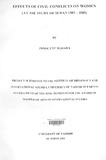| dc.description.abstract | This study investigates the effect of civil conflict on women by focusing on the Sudanese Conflict between 1983 and 2005. The analysis sought to understand women's experiences in the civil conflict.
The study reached a number of findings. Firstly, in early scholarly work on feminism and conflict studies, women were depicted as always peace loving while men were presented as more inclined to violence and fighting. In fact war was viewed as a "men-alone" business. However, in modern wars, this claim is not supported by the reality. Instead men and women are both victims and perpetrators in civil conflict. Secondly, the Sudanese civil conflict has led to a change in gender roles at the household, community and national levels. Women are now performing roles that were previously men's only tasks and vice versa.
The study concludes that warfare affects male and women differently. For many men, civil conflict means that they will be forced to leave their homes and their families to fight, or to find an alternative livelihood elsewhere. On the other hand, civil conflict may mean that
women may be compelled to take on roles previously dominated by men . | en |

